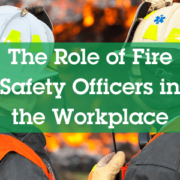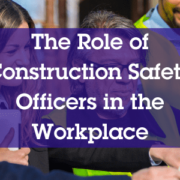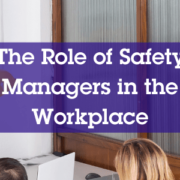Role of Safety Officers in the Workplace
In modern workplaces around the world, prioritising the well-being of employees has become a cornerstone of success. At the forefront of this effort are Safety Officers, individuals tasked with ensuring a secure and healthy working environment. This blog explores the importance of Safety Officers in the workplace, outlining their key responsibilities, the expectations associated with their role, and the many ways in which they contribute to the workplace.
The Role of Safety Officers
As a Safety Officer, your primary objective will be to ensure a safe and healthy working environment for all employees. This involves implementing and maintaining safety protocols, procedures, and policies across the organisation. The key duties include risk assessments, hazard identification, and the development of strategies to mitigate potential dangers.
Expectations of the Role
The expectations placed upon Safety Officers are varied. They are expected to proactively identify potential hazards, conduct thorough risk assessments, and implement procedures to prevent accidents and injuries. Staying informed about evolving health and safety regulations is paramount, as Safety Officers roles are vital in ensuring that the workplace remains in compliance. Effective communication skills are also crucial, as Safety Officers often act as conduits between management and employees, addressing concerns and actioning issues.
Some core responsibilities of a Safety Officer include:
- Risk Assessment: Conducting thorough assessments to identify potential hazards and evaluating the associated risks. This includes examining work processes, equipment, and the overall workplace environment.
- Policy Development: Collaborating with management to develop and implement safety policies that align with industry standards and legal requirements. These policies serve as guidelines for employees to follow in their day-to-day activities.
- Training and Education: Organising and delivering safety training programs to employees at all levels. This ensures that everyone is well-informed about safety procedures, emergency protocols, and the proper use of safety equipment.
- Incident Investigation: In the unfortunate event of accidents or incidents, Safety Officers play a pivotal role in conducting thorough investigations. This includes identifying the root causes and recommending preventive measures to avoid similar occurrences in the future.
- Regulatory Compliance: Staying abreast of health and safety regulations and ensuring that the organisation complies with relevant legislation. This involves regular audits and inspections to maintain a high standard of safety.
- Emergency Preparedness: Developing and implementing emergency response plans to handle situations such as fires, natural disasters, or other unforeseen incidents. This includes conducting drills to ensure that employees are well-prepared for emergencies.
- Continuous Improvement: Proactively identifying opportunities for improvement in safety procedures and advocating for enhancements. This involves working closely with different departments to maintain and improve health and safety within the organisation.
A final look at the role
Safety Officers play a pivotal role in creating a workplace that prioritises the well-being of its employees. Their many responsibilities, from risk assessment to training and compliance, contribute to a positive and safe work environment. Safety Officers not only mitigate risks but also enhance productivity, efficiency, and the overall success of the organisations they serve. They are the guardians of well-being, ensuring that employees can thrive in a safe and secure workplace.








Leave a Reply
Want to join the discussion?Feel free to contribute!